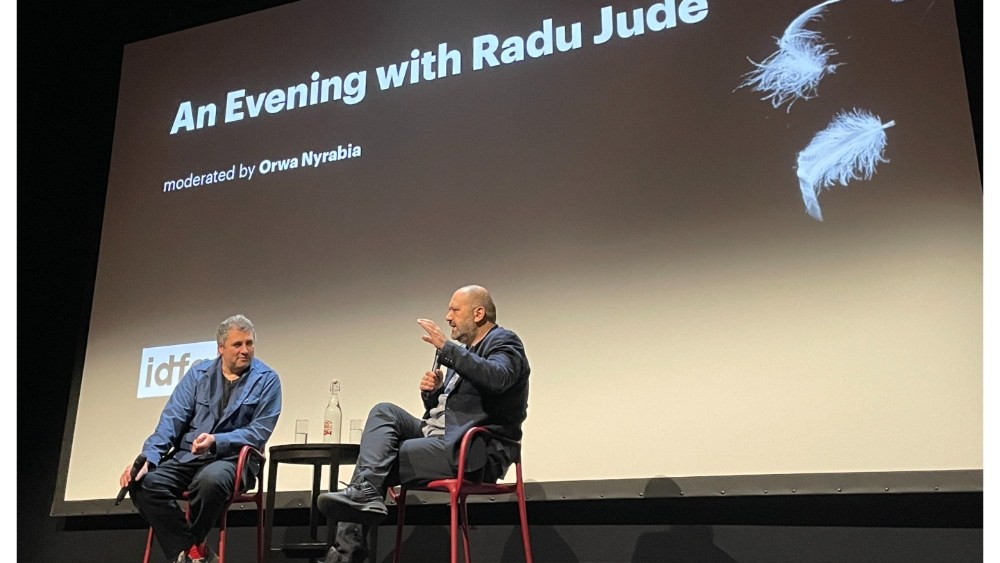Romanian director Radu Jude thinks it is time for filmmakers to start out taking TikTok severely. Throughout a dialog on the Amsterdam Worldwide Documentary Movie Competition, Jude pulled out his smartphone and confirmed the viewers a collection of TikToks, saying: “To me, TikTok is like the start of cinema. Like Lumière.” Filmmakers are in hassle as a result of that is earlier than us, and when you take filmmaking severely, it’s a must to take it severely. [TikTok]”.
This conclusion was reached after IDFA Inventive Director Orwa Nyrabia moderated the dialog, which highlighted the interconnections in Jude’s work. On this regard, Jude mentioned that some artists are “very aware” about their work, and a few individuals “make films with out eager about the connection between them. I really feel like I belong to this” [group]”.
“It is greed. I really feel very grasping as a result of I need to do every little thing,” he added. “I am making ready a movie in France and I am scared, but it surely’s a great factor not to consider whether or not the movie will likely be good or accepted in Berlin, Cannes… I’ve this grasping factor to attempt . I wished to make a documentary. I used synthetic intelligence generated pictures in a movie I made final 12 months about Dracula and that was every little thing to me.
Jude’s dialog happened after a screening of his two most up-to-date movies, “Sleep #2” and “Eight Postcards from Utopia.” The previous is an impressionistic collage broadcast reside from Andy Warhol’s grave on the webcam community Earthcam, and the latter is made up of dozens of Romanian advertisements, co-directed with thinker Christian Ferencz-Flatz Composition, promoting was produced throughout the nation’s transition from socialism to capitalist democracy.
“In my tradition, making movies is taken into account extraordinarily troublesome, costly and stuffed with guidelines – written and unwritten. Distribution continues to be an issue, both it is a industrial launch or it must be at festivals. All of this creates a It was a tense, emasculating ambiance,” Jude mentioned. “I found Warhol seven years in the past and have become fascinated along with his filmmaking. His movies had been complicated, his filmography wealthy but unknown. I needed to see it [his films] Pirating as a result of it was the one approach I had entry to his work.
The director added that Warhol was the one artist who answered the query of make a film by saying, “You choose up a digicam, you press a button, and also you get a film.” “The man was proper, that is what filmmaking is. From there, issues acquired extra sophisticated and extra nerve-racking. However when you step again, you will see that Warhol was proper.
Jude considers Sleep #2 to be a “footnote” to Warhol’s basic 1964 movie Sleep, which consists of a loop of footage of the American artist’s lover, John Giorno, sleeping. The unique concept got here from a “joke” Jude made when he first found webcams. “Warhol made ‘Sleep,’ and now he’s acquired everlasting sleep. I really feel a little bit embarrassed as a result of a number of of my movies begin with jokes—and so they’re not essentially good jokes—however a joke can set off A collection of ideas.
“I believe [‘Sleep #2’] Among the finest issues I’ve finished. It is an impressionistic movie and I discovered quite a lot of concepts about what movie is, the character of imaging and surveillance [through making the film],” he mentioned, including that the problems felt “trivial” contemplating “what is going on on on the earth in the present day.” Jude additionally talked about how “Sleep #2” is his first movie that “has by no means set foot in america.” American Cinema, thereby exploring the elasticity of filmmaking.
In “Eight Postcards from Utopia,” Jude says that he known as Ferenc Fratz “as a result of I wasn’t certain I might manage the movie, and he had written about promoting. We knew We’re making a film about present historical past, but it surely’s historic, and it is each attention-grabbing and painful to see how naive everyone seems to be.
The director says that the post-revolutionary interval in Romania “was not solely a time of political and social upheaval, but additionally a time when the nation opened as much as different cultures and the way I found cinema.” This period within the nation ignited the filmmaker’s lifelong fascination with historical past Love, he mentioned, was an period that sparked a widespread “curiosity within the origins of our society.”
“I keep in mind when my father got here dwelling, he labored for a state-owned firm that had been privatized, and he had a bit of paper as a result of everybody who labored there obtained inventory. Then the corporate collapsed. It had zero worth. Individuals everywhere in the nation They’ve all been fooled. Promoting is a approach of fulfilling individuals’s hopes, so this can be a film about individuals’s hopes.
Nonetheless, Jude says not every little thing that occurred in Romania after the shocks of the Nineties was dangerous. The director confused that the nation’s EU membership was an “necessary step”, a step that continues to be essential in the present day at the same time as he acknowledged the rising spirit of “sovereignty” in Europe and the world. “I believe it comes from Trump and [this idea of] America First, Make America Nice Once more.
The Romanian filmmaker mentioned he thinks it is necessary for “movies to cope with issues that do not go effectively” and that “the digicam is supposed to indicate imperfections.”
“Individuals at all times ask me why I’m anti-Romanian, or why I do not present my good aspect. My solely reply is the one doable [of filmmaking] Jude instructed him, “The one purpose to make a film about historical past is to have a connection to the current.”

